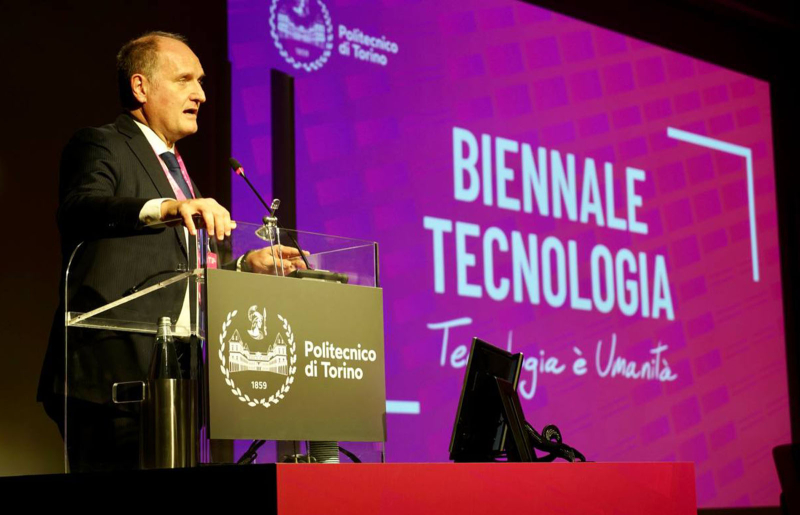Culture
Virtue lies in the middle
An interview with Guido Saracco, the dean of the Politecnico di Torino, on the complex and much debated relationship between technological development, humans and society.
Nov 2022
On the occasion of the third edition of Biennale Tecnologia, a four-day event organized by the Politecnico di Torino and attended by more than 50,000 people, we took the opportunity to have a chat with Guido Saracco. From technology to civil society and from the key role of young people and education to sustainability: the rector of the Politecnico di Torino and president of Biennale Tecnologia touched on some of the main themes of the event. This edition focuses on "Principles”, understood as new beginnings and the basis on which to build a world that is better, fairer and more democratic.
You recently spoke of technological innovation as an "enabler for reducing social inequalities." In what way can this be brought about?
"It can only be brought about if addressed in a specific policy. As a general rule, economic development has been based solely on market laws, with technologies developed exclusively for the market. One example is big tech companies that manage data for profit – with the exception of Chinese companies that have different logics for surveillance and monitoring. This only increases social gaps and inequalities, because what happens is that the logic of the market leads to the centralization of wealth in the hands of a minority and, if measures are not taken to protect society, this increasingly impoverishes other people. The natural tendency toward the laws of the market has led to a gradual move of the public to the private sector. A case in point during the Covid-19 pandemic was healthcare, for which we all paid to a greater or lesser extent depending on which region we lived in. Those that have fared worse are the very regions that, over the years, have reduced public spending to the benefit of the private sector, and therefore only the better off have fared the best. This obviously has only increased social inequality".
So what role do technologies play?
"Technologies are a facilitator, a tool made by man for man. For these to help reduce inequalities, it is necessary for the state to address them and not just for the market. And this is why people have begun to talk about environmental, social and governance (ESG) goals. This is extremely important, because classifying industrial products and processes on the basis of environmental and social impact makes it possible to create benefit for society. If this enters the fabric of every company automatically, the reduction of inequality will go hand in hand with economic and technological development.And in certain sectors – such as that of common assets (energy, water, waste, health, etc.) – if we want a more acceptable level of quality management, the state needs to be more resourceful: for example, by introducing policies aimed at increasing skills, making bureaucracy smoother and driving technological innovation, while obviously looking ahead to the future so as not to lose touch with the times and waste resources unnecessarily. It is necessary to reduce bureaucracy and value the responsibility of people who implement processes, and not blame them for mistakes; we need to shift from a Weberian bureaucracy to a smooth one that values people by encouraging them".
As you are well aware, the development of innovative technologies is also a central issue for the decarbonization of the aviation sector. To achieve this ambitious goal, in your opinion, what role should the Italian university play?
"We have thought long and hard about this and carried out analysis to see how our training and research activities touch on ESG issues. We placed a stronger focus on meeting these global development goals, and this led to the creation of a structure with the former director of the sustainability department of the Joint Research Center of ISPRA (Higher Institute for Environmental Protection and Research). We appointed him coordinator of the University's "Foresight" group entrusted with carrying out impact studies and research and holding classes on sustainability issues, involving also human and social scientists, economists and lawyers. Students will work in teams to address the 6 major global challenges: climate change, the digital revolution of cities and businesses, reducing inequality, the health of the future, water and energy. These are challenges involving issues of primary concern for the state. We absolutely have to follow this path if we want an engineer to understand what problems need to be solved with technology. And of course, it is also necessary to anticipate the impact that each technology can have. Politicians, scientists, professors, researchers and industrialists must work together with intermediary bodies – like banking foundations willing to help fund these projects – to find suitable technological solutions. All extreme views, from the more philosophical ones – such as happy decline – to technocratic ones – putting blind faith in technological innovation – are wrong".
How do you find the right compromise?
"The middle ground is the hardest thing to find, because you don't find it by becoming Leonardo Da Vinci – i.e. omniscient – but you need to have a broader understanding of the world around you, and that is why we hold courses in ethics, sociology, law and economics for our engineers. It is crucial to bring people together in the study of human beings and technological innovation in order to devise new solutions and communicate them better and make them more applicable to society".
"It is crucial to bring people together in the study of human beings and technological innovation in order to devise new solutions and communicate them better and make them more applicable to society"
As technology becomes more and more widespread, this generates greater interest from society as a whole despite its inherent complexity. In your opinion, how can the concept of technological development be made more understandable?
"Ordinary people place technology in a dimension of partial availability that is the preserve of the rich and therefore fear its social repercussions. Instead, to overcome this, we need to explain it well, engage people, and show that we are proposing an ethical and purposeful use of technology to solve the most complex challenges and improve the welfare of people, breaking away from market logics. We scientists need to popularize, but also teach elements of technologies and technological development to policymakers – those people who translate political direction into law – to third-sector practitioners, industrial managers and, finally, to those who cooperate on an international level. Innovation is carried out by everyone all together, and not by isolation".
The Politecnico di Torino and Avio Aero have worked together for a long time in the research and development of new technologies as well as in the training of new talent. What does this partnership mean to you?
“Our collaboration with Avio Aero goes back a long way and is very important. As the Politecnico di Torino, we have a "workhorse" in additive manufacturing for which – thanks also to our partnership with Avio Aero – we have set ourselves to become a national benchmark in this technology. We have invested not only in research, but also in the testing of innovations that can then be introduced in companies. Turin is an aerospace research-oriented city not without reason having, among others, Avio Aero, Leonardo, Thales Alenia Space and Altec well established in its industrial fabric".






